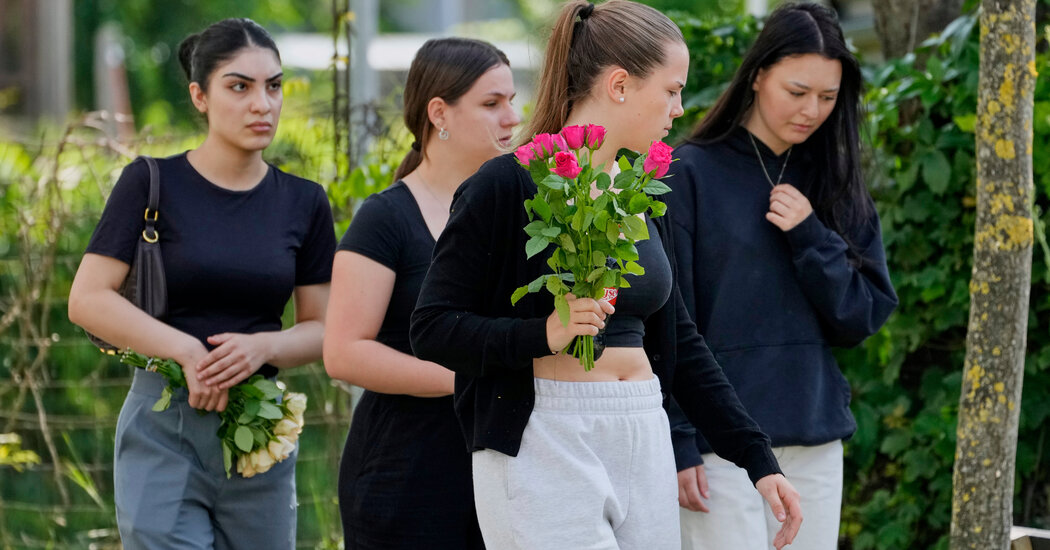A young man who the Austrian authorities say killed 10 people in a shooting rampage at his former high school in the city of Graz this week was a loner obsessed with online shooting games who failed a psychological test needed to enter the army, officials said on Thursday.
A spokesman for the defense department, Col. Michael Bauer, told The New York Times that the 21-year-old suspect had attempted to pursue his military service, which is mandatory in Austria, but had failed the test. He was, however, able to pass a psychological exam required for obtaining a gun, other officials said.
At a news briefing in Graz, Michael Lohnegger, the officer who is overseeing the police response, said the suspect “lived an extremely reclusive life and was unwilling to participate in normal activities outside in the real world.” Instead, he was devoted to first-person-shooter video games, Mr. Lohnegger added.
The Austrian Interior Ministry said on Wednesday that officials were investigating how a state-certified psychologist could have approved the man for a firearms permit. Colonel Bauer said that the Defense Ministry was not allowed to pass on information about its own psychological tests to other government agencies.
The suspect is accused of using two weapons — a handgun and a sawed-off shotgun — to kill nine students and a teacher.
A profile of the suspect, whose identity has not been revealed because of privacy laws in Austria, has been slowly emerging in the past two days from details provided by the authorities and from local media reports.
The police have said he was born and raised in Austria. News reports have stated that he was living with his mother in Kalsdorf, a small bedroom community just south of the Graz airport. The police, who have largely refused to confirm any identifying details, have said that they searched his mother’s house there on Tuesday.
The police said that the man left the school after twice failing to pass the equivalent of the 10th grade. When officers stormed his apartment on Tuesday afternoon, they found a nonfunctioning pipe bomb and a detailed handwritten plan for the attack, the police added.
The gunman went to the school, in a working-class neighborhood in Graz, Austria’s second-largest city, on Tuesday morning after a three-day holiday weekend.
He walked onto the school premises at 9:43 a.m. with the guns and a significant amount of ammunition hidden in his backpack, the police said. He went into a bathroom on the third floor where he donned sports goggles, a headset and a belt with a hunting knife.
He took the stairs to the second floor and started shooting, apparently randomly, at children in a classroom, the police said. He then returned to the third floor and fired his way into a locked classroom, where he shot more students. While the killings seemed completely random, the suspect did know the teacher who was killed, the police said, adding that they were investigating whether she had been targeted on purpose.
The police said the rampage lasted seven minutes and ended with the gunman shooting himself in the head in a bathroom. They said they were unsure if the arrival of officers had precipitated the suicide but added that the shooter had lots of unspent ammunition.
Although school shootings are exceedingly rare in Europe, the students in Graz were prepared for such an attack, Norbert Urabl, deputy director of the school, said during a TV interview on Wednesday.
Mr. Urabl said that students had asked teachers about what to do during a shooting when emergency plans were discussed during annual evacuation exercises.
“Thankfully, many teachers and students reacted correctly,” he noted. “They locked the doors, blocked those that were unlocked with tables and built barricades.”
After the attack, the police were widely praised in Austria for responding quickly and with force.
Six minutes after a neighbor called to report shots, the first patrol car arrived. More pulled up two minutes later, bringing the first of more than 50 COBRA officers — Austria’s version of SWAT teams. The armed officers immediately ran into the school.
The police said that the response was part of a strategy that officials drew up after studying shootings abroad. Those tactics include racing into an active shooting situation as soon as officers arrive.
“We cannot establish perimeter protection and wait for special forces to go in. We must equip all officers to be able to go in,” the national COBRA director, Bernhard Treibenreif, said in a television interview on Wednesday.
To enable that, even regular police officers travel with bulletproof vests and ballistic helmets.
On Wednesday afternoon, mourners gathered in a central square in Graz, lighting candles and laying flowers, as they had done the night before.
The Austrian president, Alexander Van der Bellen, also attended to pay his respects, to thank emergency workers and to promise that the facts around the tragedy would be fully uncovered.
“How on earth did it happen,” he said, “that a 21-year-old man made himself lord of life and death, and indiscriminately killed children and young people?”
Christopher F. Schuetze is a reporter for The Times based in Berlin, covering politics, society and culture in Germany, Austria and Switzerland.
Jim Tankersley is the Berlin bureau chief for The Times, leading coverage of Germany, Austria and Switzerland.
The post Suspect in Austrian School Shooting Was a Loner Rejected by Army, Officials Say appeared first on New York Times.




